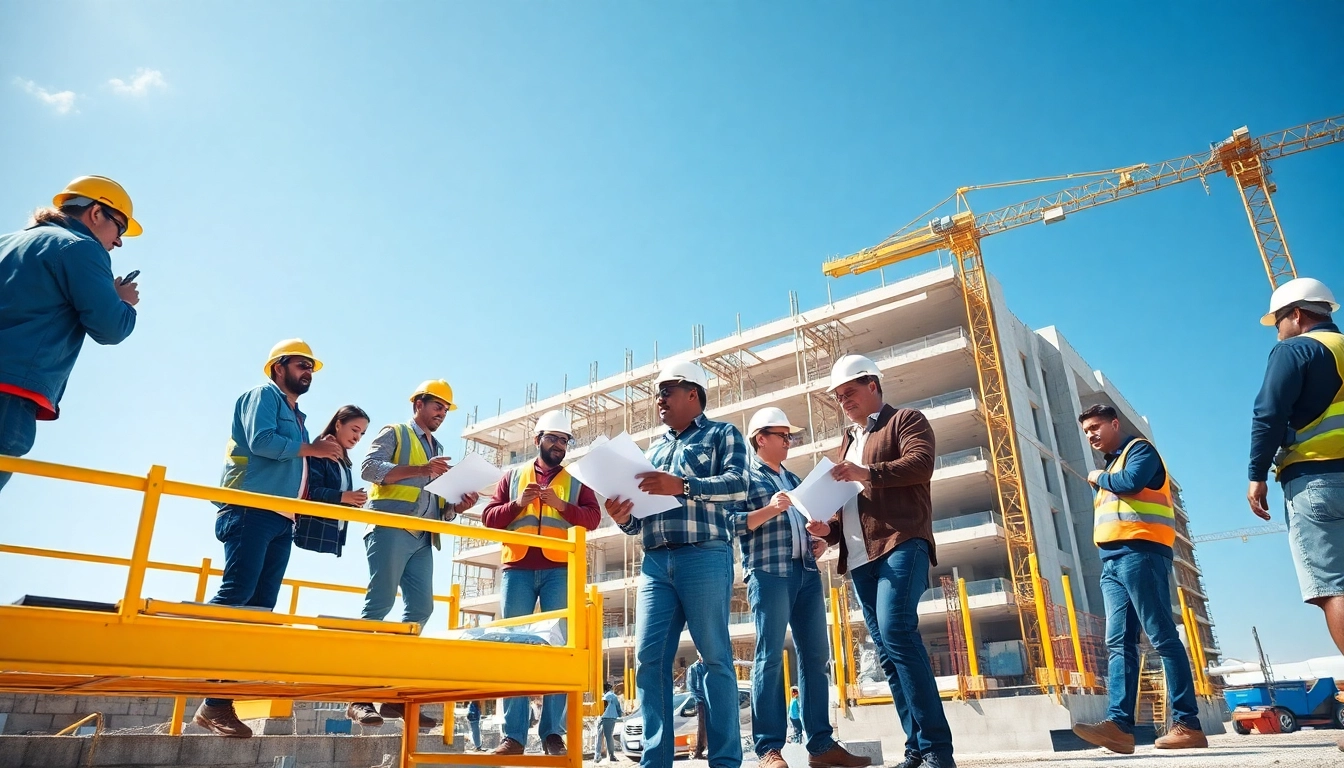Understanding the Importance of Construction Association Denver
In the fast-evolving landscape of the construction industry, associations play a crucial role in fostering collaboration, promoting professional development, and advocating for member interests. The construction association denver serves as a vital hub for stakeholders, bridging gaps between various players in the sector. Understanding the multifaceted importance of such an association is the gateway to leveraging its benefits.
The Role of Industry Advocacy
Advocacy is one of the primary functions of any construction association. In a vibrant market like Denver, where construction plays a significant role in economic development, associations serve as the voice for many professionals. They engage with policymakers, lobby for favorable legislation, and ensure that the concerns of their members are heard. This advocacy extends to addressing issues such as labor laws, environmental regulations, and safety standards that affect the construction sector.
By participating in advocacy efforts, associations not only protect their members’ interests but also help shape a better regulatory environment that benefits the entire industry. This active engagement ensures that the construction sector remains resilient even in the face of challenges, making it essential for professionals to align with such organizations.
Benefits for Members
Being part of a construction association offers numerous benefits that enhance a member’s professional journey. Members gain access to resources that can significantly boost their operational efficiencies, from industry insights and trends to market analysis. Moreover, members often receive discounts on services, materials, or continuing education opportunities, which can lead to notable cost savings.
Furthermore, construction associations often facilitate certification programs, ensuring that members stay updated on the latest industry standards and practices. This commitment to continuous learning helps members maintain competitive advantages in their respective niches, positioning them favorably against rivals in the market.
Networking Opportunities
Networking is an invaluable aspect of any professional industry, and the construction sector in Denver is no exception. Construction associations offer multiple platforms for networking—be it through conferences, workshops, or informal meetups. Such gatherings provide opportunities for members to share knowledge, collaborate on projects, and build lasting relationships.
Furthermore, these interactions can lead to partnerships that enhance project outcomes, cultivate mentorship relationships, and offer job opportunities. Being part of a robust network invariably translates into enhanced business prospects, which is integral in a competitive landscape.
Key Services Offered by Construction Associations
Educational Resources and Training
Construction technology and methodologies evolve continually, making ongoing education vital. The construction association denver provides a comprehensive range of educational resources—from technical workshops to seminars on safety regulations. These resources are tailored for every level of expertise, ensuring that everyone from novices to seasoned professionals can benefit.
By offering training sessions on best practices, project management, and new technologies, associations equip members to improve their skills and manage projects more effectively. Additionally, they can facilitate scholarships and grants for further learning opportunities, encouraging growth within the community.
Regulatory Support and Compliance
Navigating the regulatory landscape can be complex for construction professionals. The construction association denver serves as a critical resource for understanding and complying with various regulations. By providing insights into local laws, zoning regulations, and safety standards, associations help members mitigate risks associated with non-compliance.
Moreover, associations often work closely with regulatory bodies to advocate for sensible policies that promote safe and efficient construction practices. This relationship ensures that members are not only compliant but also well-informed about upcoming regulatory changes.
Professional Development Programs
Professional development is imperative in an industry driven by innovation. Recognizing this, construction associations offer in-depth programs designed to foster growth. These programs might encompass leadership training, advanced project management techniques, and financial management for construction professionals.
Through mentorship initiatives, seasoned experts can share their insights, helping newer members navigate the challenges of the industry. This culture of shared learning promotes personal growth and strengthens the overall construction community.
Engaging with the Local Construction Community
Events and Workshops
Events and workshops organized by the construction association denver are pivotal in building community ties. These events serve as platforms for education, networking, and sharing the latest industry trends. Regular events can range from informal meet-and-greets to large-scale trade shows that showcase innovations and promote local businesses.
Participation in such events not only enhances visibility for individual members and their companies but also fosters a collective identity within the industry. Engaging with peers strengthens community bonds and reinforces a shared commitment to excellence in construction.
Local Partnerships and Collaborations
A strong local presence enhances the efficacy of construction associations. By collaborating with local governments, educational institutions, and business chambers, associations can create a robust support system for the construction community. These partnerships may lead to joint initiatives beneficial for training programs, workforce development, and infrastructure projects.
Tapping into local resources and establishing partnerships with other organizations amplifies the collective impact on the construction landscape, fostering growth and innovation across the board.
Promoting Diversity in Construction
Diversity within the construction sector not only increases creativity and innovation but also reflects the community it serves. The construction association denver champions initiatives aimed at promoting diversity and inclusion within its member organizations. This commitment can include outreach programs targeted at underrepresented groups in construction, as well as training sessions designed to eliminate bias in hiring practices.
By fostering an inclusive environment, associations can help cultivate a workforce that brings varied perspectives and approaches to problem-solving. Promoting diversity helps bolster the construction sector’s sustainability and adaptability, ultimately benefiting all stakeholders involved.
Challenges Faced by Construction Associations
Adapting to Industry Changes
The construction industry is notoriously dynamic, with rapid changes driven by technological advancements, regulatory shifts, and client demands. For construction associations, staying ahead of these changes is vital. Achieving this involves constantly adapting resources and services to meet the evolving needs of the member organizations.
Finding ways to remain relevant requires ongoing engagement with industry experts and continuous feedback from members about their challenges. Associations that can swiftly respond to change will not only support their members but also secure their place as essential industry players.
Funding and Resource Allocation
Funding remains a critical challenge for construction associations. With diverse members and varying needs, ensuring equitable resource allocation can be complex. For many associations, relying on membership dues and event revenues is not always sufficient to cover operational costs, let alone fund new initiatives.
By exploring alternative funding sources, including grants, sponsorships, or partnerships, associations can expand their offerings while still ensuring financial sustainability. The successful navigation of this challenge will require transparency, accountability, and creativity in resource management.
Addressing Workforce Shortages
Workforce shortages have become a pressing issue in the construction industry, presenting significant challenges for associations and their members. Addressing this shortage requires a concerted effort from associations to promote careers in construction, advocate for skilled labor training programs, and retain existing employees through competitive employment practices.
By collaborating with educational institutions to create apprenticeship programs, associations can cultivate a new generation of skilled laborers equipped to meet the industry’s demands. Additionally, promoting construction as a viable career path will help attract diverse talent to the workforce.
The Future of Construction Association Denver: Trends and Predictions
Embracing Technology in Construction
As technology continues to reshape the construction industry, associations must embrace these advancements to stay relevant. This means adopting new tools for project management, construction methodologies, and workforce management systems. By integrating technology into their operations and the services they provide, construction associations can enhance efficiency and drive innovation.
Moreover, educating members about emerging technologies, such as Building Information Modeling (BIM) and prefabrication methods, will equip them to leverage these tools effectively. This proactive approach ensures that the local construction community remains competitive and capable of meeting modern challenges.
Environmental Sustainability Initiatives
The construction industry faces increasing pressure to adopt sustainable practices, a focus that associations must prioritize. By championing environmental sustainability initiatives, construction associations can help their members navigate the growing demand for green building practices and eco-friendly materials.
This commitment may involve establishing guidelines for sustainable construction, advocating for policies that support green building incentives, and providing resources on best practices for sustainable materials use. By incorporating sustainability, associations can play a pivotal role in shaping an environmentally responsible construction future.
Enhancing Member Engagement
As competition among associations increases, enhancing member engagement becomes essential. The ability to retain members and attract new ones hinges on how well associations can demonstrate ongoing value. Utilizing modern communication channels, including social media, webinars, and interactive platforms, can bolster engagement levels significantly.
Fostering a community where members feel heard and valued lays the groundwork for a vibrant association. Regularly soliciting feedback, initiating member-driven initiatives, and showcasing success stories can empower the local construction community and strengthen commitment to the association.



